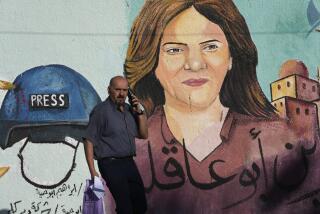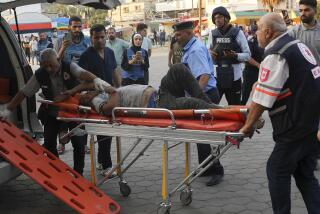Briton Assails Media Reports From Iraq : Journalism: The foreign secretary joins a chorus of angry reaction to coverage of civilian casualties.
- Share via
LONDON — Foreign Secretary Douglas Hurd on Friday entered the fierce, running debate over British media coverage of the Gulf War, declaring that there is a “good deal of concern” about journalistic reports from Baghdad.
“There is a very strong feeling in the country,” said Hurd, that television stories from Baghdad have supported the Iraqi line on Wednesday’s bombing of a structure in the capital. The Iraqis claim the bombing resulted in the deaths of hundreds of civilians.
Hurd pointed out that there were no British correspondents reporting from Berlin during World War II, “and that was right.”
His remarks topped off two days of furious reaction in Britain to reports by the two British networks, the BBC and ITN, and the U.S. broadcaster, Cable News Network. CNN said it had received 1,576 calls Wednesday--double the norm and 70% negative--about its reports on the bombing.
Like the American condemnations, many conservatives in Britain have criticized the broadcasters for airing pictures of dead women and children and for correspondents’ statements that the building appeared occupied only by civilians.
The argument has been stirred by the popular, tabloid newspapers, which have reported “thousands” of calls from irate television viewers complaining about the reports on the British networks, each of which has a crew in Baghdad. The newspapers said the networks received 600 angry calls in two days.
John MacGregor, leader of the House of Commons, said the government made “representations” to the networks after Conservative members of Parliament complained about coverage of the bombing incident from Baghdad.
MP Nicholas Soames called the TV broadcasts “grotesquely disloyal.” Dudley Smith, another MP, declared: “It is bizarre that we have British correspondents and cameramen in the very heartland of the enemy, pumping back information which is almost wholly in favor of (Iraqi President) Saddam Hussein and his very evil intents.”
MacGregor replied: “I know that many (Parliament) members generally, and members of the public, feel strongly on this issue. I think views have been made known to the broadcasting authorities along these lines.”
The networks denied that they had been approached by the government. MacGregor later admitted that the discussions were “informal” and that the government did not suggest that media reporters leave Baghdad.
Observers here said the British correspondents--Jeremy Bowen of the BBC and Brent Sadler of ITN--have been less careful with their broadcast sources than Peter Arnett of CNN. To critics, Bowen, in particular, seemed to go out on a limb in his report on the bombing by repeating, unchallenged, Iraqi casualty claims. He also estimated that only eight out of 1,000 civilians had survived the bombing.
But the BBC differed with critics, declaring: “We maintain our coverage is comprehensive and fair. Jeremy Bowen is only reporting what he sees, and it is made clear his reports are subject to Iraqi censorship.”
And ITN editor Stewart Purvis added: “We adhere to the school of fact, rather than distorting fact to boost national morale. The complaints come from the school that believes the media’s role in a time of a war is to be patriotic.”
The Daily Express, in an editorial, declared: “When we fought Hitler, we did not have to endure reports of the damage and human suffering caused by our bombers. The Nazis were left to handle their own propaganda. And Saddam should be left to do his. The government, too, has voiced concern about reporting from Iraq. It is time the TV crews in Baghdad packed their bags and came home.”
At the upscale end of the newspaper market, Max Hastings, editor of the Daily Telegraph and a former war correspondent, decided not to send a reporter to Baghdad when he had the chance recently on the grounds that such reports would amount to enemy propaganda.
And a Daily Telegraph editorial Friday declared: “It is the broadcasters whose coverage, thus far, threatens their standing and respect from the public, which displays more grim common sense about the war than those in the studios.”
But the Times of London took the opposite tack, arguing: “Today, images of war are flashed round the globe in seconds, to be distorted, exploited, debated, challenged. The only antidote to false information is accurate information, not less information. Lies can only be defeated by a relentless search for truth, not by silence.”
More to Read
Sign up for Essential California
The most important California stories and recommendations in your inbox every morning.
You may occasionally receive promotional content from the Los Angeles Times.













